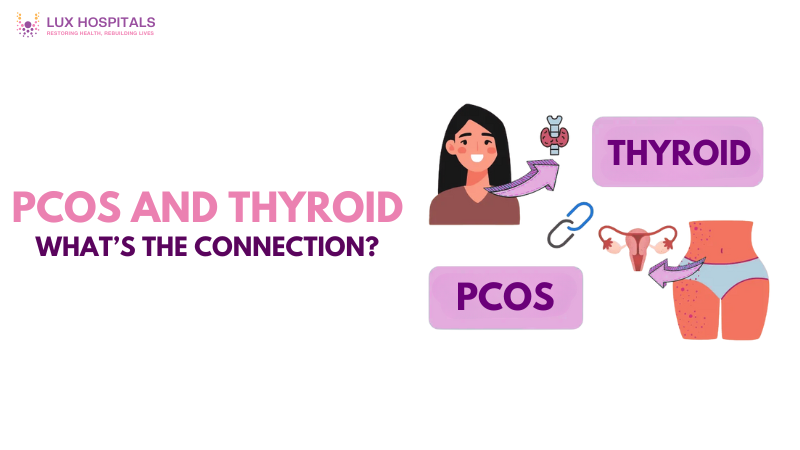PCOS and Thyroid: What’s the Connection?

Struggling with irregular periods, weight gain, or unexplained fatigue? You’re not alone. Many women silently face these issues, often without knowing the underlying cause. Two of the most common endocrine disorders in women—PCOS (Polycystic Ovary Syndrome) and thyroid dysfunction—are usually found together. But how do thyroid issues and PCOS relate to one another, and what impact does this have on your health?
Let’s dive into the link between these two hormonal conditions and understand how early diagnosis and holistic care can make a difference.
Understanding PCOS and Thyroid Disorders
An excessive production of androgens (male hormones) by the ovaries causes PCOS, a disorder that can cause symptoms like irregular periods and acne, hair growth on the face/body, and difficulty getting pregnant. Women with PCOS also often have insulin resistance, making weight management a challenge.
On the other hand, thyroid disorders especially hypothyroidism (underactive thyroid)—occur when the thyroid gland doesn’t produce enough hormones to regulate metabolism. Fatigue, weight gain, dry skin, depression, and irregular menstruation might result from this.
What’s the Link Between PCOS and Thyroid?
Thyroid disorders, particularly hypothyroidism, are more common in women with PCOS, per multiple research. But why?
1. Hormonal Imbalance
Both PCOS and thyroid disorders involve hormonal imbalances that affect reproductive health. An underactive thyroid can disrupt ovulation and cause symptoms that mimic or worsen PCOS, such as irregular periods and weight gain.
2. Insulin Resistance
PCOS is characterized by insulin resistance, which is also connected to thyroid problems. A slow metabolism and increasing PCOS symptoms can result from elevated insulin levels that interfere with thyroid hormone conversion.
3. Increased Androgens
Women with both PCOS and hypothyroidism may have elevated levels of androgens, which can cause unwanted symptoms like acne, hair thinning, and hirsutism (excessive facial/body hair).
PCOS and Thyroid: Shared Symptoms
If you’re dealing with PCOS and thyroid issues, you might notice overlapping symptoms, including:
- Irregular or absent periods
- Difficulty losing weight
- Fatigue and low energy
- Hair loss or thinning
- Mood swings or depression
- Infertility or trouble conceiving
If you experience several of these symptoms, it’s essential to consult a gynecologist or endocrinologist who can check for both conditions. Diagnosing one doesn’t mean the other isn’t present.
Managing PCOS and Thyroid Together
The good news? Successful management is possible under both scenarios, particularly with a customized strategy.
1. Lifestyle Changes
Hormone regulation can be improved by stress reduction, regular exercise, and usual diet. Normal diet aids in insulin resistance, exercise aids thyroid function and weight regulation.
2. Medication
Thyroid hormone replacement treatment might be recommended for you for hypothyroidism and hormonal pills, metformin, or ovulation-inducing drugs for PCOS. Your doctor will customise the treatment depending on your symptoms and fertility goals.
3. Regular Monitoring
Hormones are sensitive to change. Frequent check-ups guarantee that your treatment is still working and can be modified as necessary.
Can PCOS Cause Thyroid Problems or Vice Versa?
There’s no evidence that one directly causes the other, but they share many common pathways. Inflammation, insulin resistance, and genetics play a role in both conditions, so they often occur together.
Conclusion
If you’re searching for answers about irregular periods, persistent fatigue, or fertility struggles, don’t overlook the connection between PCOS and thyroid. A combined approach to diagnosis and care can make all the difference in how you feel physically and emotionally. Don’t wait for symptoms to worsen. Schedule your consultation today and get the clarity and care you deserve.
Frequently Asked Questions
Yes. Both conditions can interfere with ovulation, but with proper treatment, many women can successfully conceive.
Yes, managing weight can be more challenging, but with the right plan, weight loss is still achievable.
Yes, in milder conditions. However, a mix of medicine and lifestyle changes is beneficial for many women.
Thyroid issues are not directly caused by PCOS, although they frequently coexist because of things like inflammation, insulin resistance, and hormone abnormalities. For an accurate diagnosis and course of treatment, both must be closely monitored.
To help your thyroid naturally return to normal, promote a well-balanced diet high in zinc, selenium, and iodine, manage stress through practices like yoga or meditation, get regular exercise, and ensure adequate sleep. Avoid processed foods and excessive sugar; consider limiting gluten if you’re sensitive. Before quitting or altering any thyroid medication, always get medical advice.





















